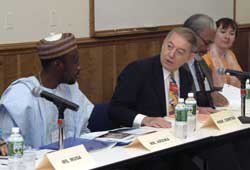Muslim Educators Discuss Education, Civics and Contemporary Issues at TC
Eight educators from countries spanning from Africa to Asia came to Teachers College on April 15, the final stop in a multi-city tour of the United States. The group of Muslim educators from Bangladesh, India, Indonesia, Malaysia, Nigeria, Pakistan, and Tanzania participated in a forum called "Teaching About Tolerance, Ethics, and Multiculturalism: Perspectives of Muslim Educators."
The group of seven men and one woman were brought here through a program sponsored by the U.S. State Department's Bureau of Educational and Cultural Affairs, and by the Meridian International Center, a Washington, D.C.-based nonprofit that promotes international outreach and exchanges. This particular delegation was of non-Arab Muslims, although a separate (but similar) outreach program is centered on Muslim educators from Arab nations, said Sheridan "Sherry" Bell, program officer for Meridian. The delegation visited various parts of the U.S., beginning in Washington D.C. and traveling to Baltimore, Akron, Cleveland and Kansas City, Missouri. Members of the group stayed in private homes in Akron, and conducted site visits in a number of public, private, and charter schools in the cities they visited, Bell told Inside TC.
Among the goals of this group visit was to provide the educators, who come from widely variant educational systems, with a first-hand view of how the U.S. public school system separates church and state; to discuss issues of tolerance, ethics, and citizenship in a multicultural society; to observe how academic curricula treats ethics and multiculturalism; and to study the roles of state and local governments, as well as school boards, in designing curricula and setting standards for civic education. While there was some discussion of civics education during the TC forum, particularly in the Malaysian national curriculum, most of the educators spoke about how socioeconomic conditions affected schooling in their countries, and how millions of children-especially after the primary grades-are not in school at all.
One of the educators from Nigeria, Adamu Danjuma Khalid, Deputy Director of the National Commission for Mass Literacy, Adult Education, and Non-Formal Education (Abuja, Nigeria), spoke about how religion, politics, historical context, and unemployment all impacted the provision of education in Nigeria, particularly in the north of the country. Khalid told the audience that in the south of Nigeria, where Western missionaries have long-established roots, there is a higher literacy rate-in some states as high as 85 percent of the population. At the same time, the missionary schools often sought to convert children to Christianity, which provoked a popular reaction as the schools began to spread northwards to the more predominantly Muslim regions. In recent years the Nigerian government forged an alliance with "Koranic schools" in the north of the country, Khalid said, to create mutually acceptable curriculum that teaches Islamic values as well as core academic subjects. While Khalid estimates that there are about 20 million Nigerian children attending school, some 50 million people remain illiterate, and in some states there are 150 children per teacher.
The problem of child labor was also brought up by several of the educators, and the representative from Bangladesh, Tanbir Ul Islam Siddiqui, noted, "Often, having children go out to work is required for a family's survival." Siddiqui said that in most cases the make-or-break issue was figuring out how to sustain a family's finances if a child is at school, rather than in the labor market. He said that a USAID program in Bangladesh, called "Time Out," provided some families with stipends, allowing their children to attend school and reduce the incidence of child labor, but at present the program "is a drop in the bucket" compared to what is needed. Siddiqui, who is currently the president of an organization called Change Makers (he is also a lawyer), said that about 50,000 children are served by "Time Out" and similar programs, while there are an estimated 7.5 million child laborers in Bangladesh.
Of the countries represented, the most developed and widely implemented civics education program appeared to be Malaysia's. Kalthom Musa, the only female in the delegation visiting TC, said that Malaysia is in the process of putting civics education back into the national curriculum. Musa, who is Assistant Director and head of the Preschool Unit in the Curriculum Development Center at the Ministry of Education (Kuala Lumpur), said that civics had been taught as a separate subject until 1983, when the country's primary curriculum was revised to teach civics across the curriculum. The latest change will see "a specific civics education course to be reintroduced into the primary and secondary school curriculum" at the beginning of the next school year, Musa said. Teaching civics-including tolerance-is important to a nation that sees itself as "a multicultural country in Asia," she said. In the upper grades, children are required to complete a citizenship project (and are allotted 10 hours to do it). After graduation, all students are required to perform three months of national service, she added.
The forum was co-moderated by three professors from TC's Department of International and Transcultural Studies: Lambros Comitas, the Gardner Cowles Professor of Anthropology and Education; George Bond, the William F. Russell Professor of Anthropology and Education; and Frances Vavrus, Assistant Professor of Education.
Published Thursday, Aug. 12, 2004
